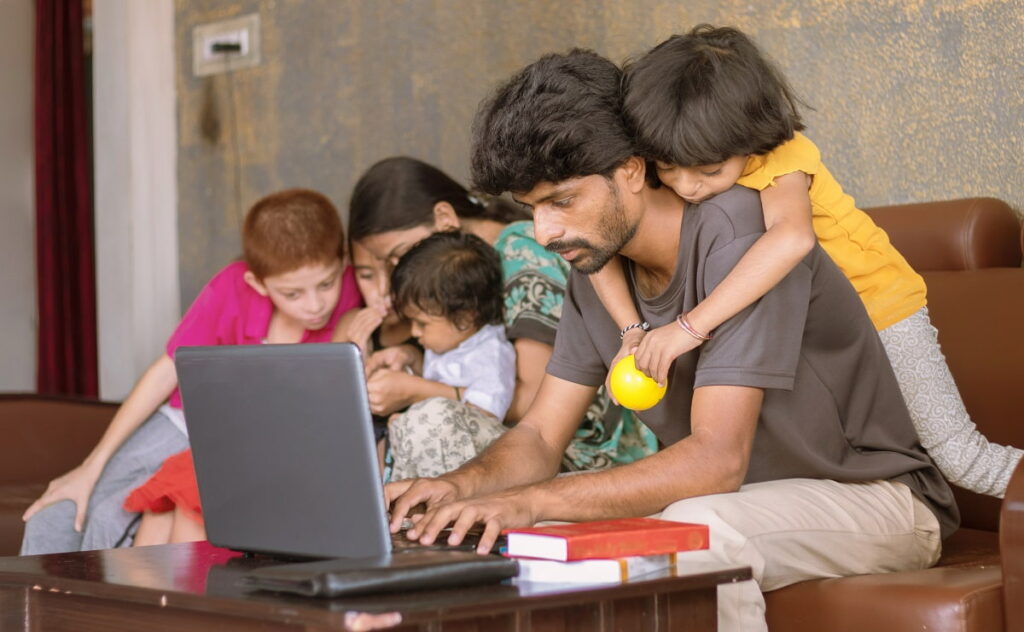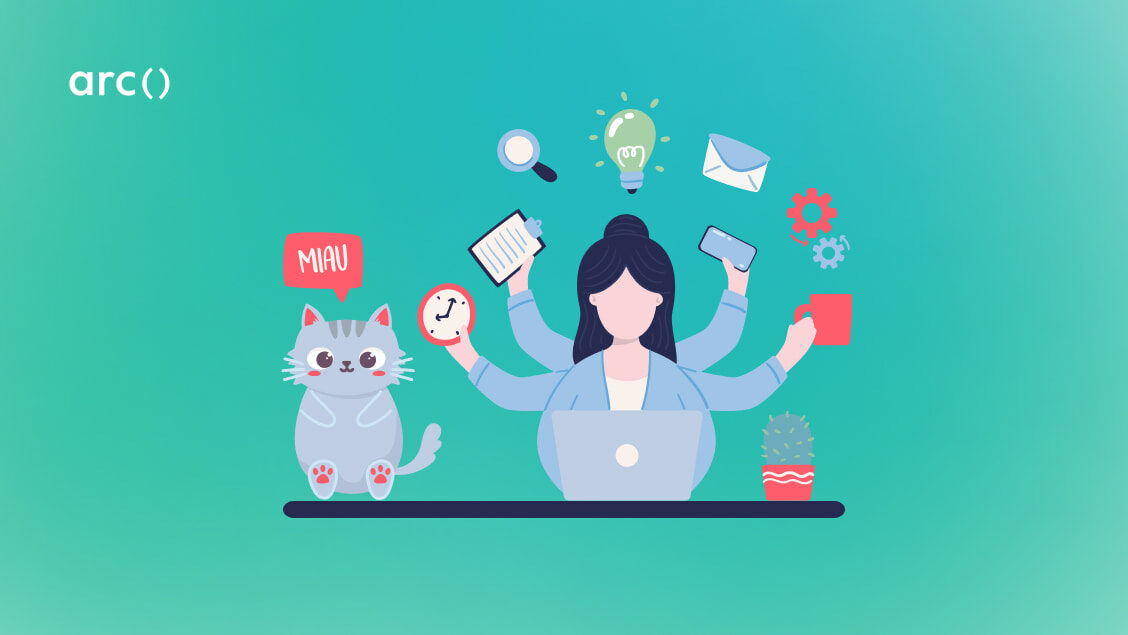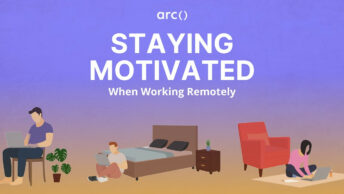Over the past two years, social distancing has completely revamped the notion of a “work environment.” Seeing as remote work, at least to a degree, is here to stay — learning how to work from home as productively as possible outside the traditional office space is now a necessity.
And while working from home does have its perks, and it does allow for more flexibility in organizing your time, it also comes with one significant caveat — distractions. With our family members and housemates all adapting to the new reality of a combined living and working space, the boundaries of acceptable behavior are becoming blurrier by the day.
In such a hectic environment, we lack many of the usual office structures that have kept us “on task” before. As a result, we must all adapt our productivity techniques to work-from-home situations to ensure an uninterrupted workflow. Luckily, there are plenty of things you can do to reduce remote work distractions — and we’ll present the main ones right here.
Find your dream remote job faster with Arc.
- Development, design, and marketing roles
- US-based startups and tech companies
- Choose freelance or full-time remote work
Work from anywhere in the world on your terms.
Join Arc now →
1. Proper Scheduling
One of the main ways to limit work from home distractions is to clearly attribute your time to specific work (and private) tasks. Once you break down every workday into blocks of time, the more precise nature of your schedule will make distractions less effective at prying you away from your work.
However, this means more than purely scheduling your work tasks. To create a distraction-free work-from-home schedule, you’ll also need to plan out your social interactions — both in your house and in the virtual workplace.
Sprinkle practical check-ins with managers and employees throughout your schedule and some short breaks to spend with people around the house. That way, when you get back to actually working, there will be fewer surprise interactions to keep you from your tasks.
2. Stop Multitasking

Yes, multitasking is a vital part of any remote developer’s job, and it’s not something to be eliminated or avoided. But that’s not the multitasking we’re talking about. When you’re spending most of your days at home, there are tons of chores and fun activities that beckon and try to pry you away from your work.
You’ve got phones and tablets that are constantly buzzing with notifications, a pile of dishes waiting since this morning, the deceptively comfy prospect of binging a TV show — it’s all there, all the time.
Especially when it comes to house chores, you may feel like some of them require your urgent attention — and you start juggling your home chores and work tasks at the same time. This is a surefire recipe for lower productivity, and you need to avoid it like the (recently quite literal) plague.
Not all of these activities are as important as you may have convinced yourself that they are. In fact, most of those distractions are just you being confused about your priorities. During work hours, you need to prioritize even the most menial work task above anything else in your home — in 99% of cases, you can finish all of that later anyway.
Read More: 10 Ways to Improve Your Leadership Skills & Advance Your Career
3. Plan For Some Warm-up Time
In these past two years, most remote developers have found that there was one particularly difficult battle in the war against procrastination: just starting work in the morning.
Even when you’ve gotten out of your warm bed, you’ve got that comfy couch just waiting for you to lounge away some more time. And just like that, hours have gone by, and you haven’t even begun your work tasks for the day.
This is particularly tough when you’ve got a to-do list that you were supposed to stick to. However, the trick to avoiding this excessive procrastination at the start of your day is to simply incorporate some of it into your schedule.
Don’t be afraid to set aside an hour for your brain to slightly “warm up” before you start working. If you give yourself enough time for breakfast and your morning coffee and know that it’s all a part of the regular schedule, you won’t feel the urge to succumb to work from home distractions later on. Soon enough, you’ll find it easier to stay motivated even during crunch time.
4. Establish an Office Environment With Boundaries

When we work in an office, there are plenty of external forces that dictate our schedule and help us stay on track — like in-person team meetings. However, seeing as those disappear when we switch to remote collaboration, we need to establish strict parameters to achieve the same effect: guarding our time “on the clock” from remote work distractions.
Think about all of the aspects of office space that suit you the most, and try to incorporate them into your new workspace. This can mean anything from how you decorate and organize your home office to the expectations you set with roommates or your family.
You need to set up and maintain boundaries that are in line with your work personality and allow you to achieve your highest levels of productivity. And this doesn’t just apply to your office space or social interactions — it also applies to time.
For instance, if you find you’re doing your best work before noon, try to do your toughest tasks during the first part of your day.
Read More: How to Negotiate Your Salary as a Remote Developer
5. Learn Your Triggers
We’ve all got certain workplace stressors — and these typically trigger our worst time-wasting behaviors. In many cases, remote developers don’t immediately recognize the things that constantly lead them down a spiral of unproductivity and procrastination.
With that in mind, it’s important to look inward and see what’s triggering you into losing focus and concentration. When you find yourself avoiding a task, face that fact and ask yourself why you’re doing that — or what specifically stressed you out into needing a break.
Some self-reflection can go a long way towards helping you set up the most productive conditions for remote work at home instead of just going down the rabbit hole of endless Wikipedia links on a completely irrelevant topic or going through dozens of YouTube videos during work time.
6. Turn Off Everything

Let’s face it — to a certain degree, all of us are addicted to our phones these days. And sure, there are still people that aren’t spending time on social networks — but even they have tons of news sites, instant messaging apps, and irrelevant emails bombarding them with notifications all day long.
Unfortunately, the other side of the coin to working in the tech industry is being even more addicted to tech — and being more prone to reach for your device when you hear a notification or in stressful situations when you want to avoid dealing with something. Technology temptation is all around us, and it’s one of the biggest work distractions out there.
That’s particularly true when you’re working from home. While the presence of hard-working colleagues and management oversight tends to keep you from spending hours on your phone while in the office — there’s none of that at home.
Considering that, you need to fight that urge in the simplest way possible: turn off everything. And yes, there are plenty of distractions to indulge in through your computer’s web browser — but you can also find addons that block all websites except for those you actually need for work.
Read More: Interpersonal Skills: What Developers Need to Know (& How to Improve)
7. Listen To Your Body
Despite all of your genuine efforts to stay productive and avoid distractions, you need to acknowledge that there will be times when you’re not at your best. Sometimes, all of us hit a wall — and eliminating all the distractions in the world won’t help if there’s a genuine reason why you’re unable to focus. If you’re feeling your brain has hit its limit and you don’t have any energy, listen to your body.
Remote work tends to wreak havoc on our work-life balance, and sometimes it’s hard to step away. But it’s important to know when you need to wind down if you want to stay productive in your actual work hours. Take some time to decompress from work completely, and your time on the clock will be more valuable to everyone.
Find your dream remote job faster with Arc.
- Development, design, and marketing roles
- US-based startups and tech companies
- Choose freelance or full-time remote work
Work from anywhere in the world on your terms.
Join Arc now →








